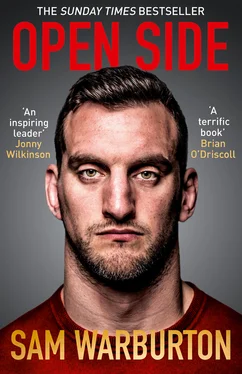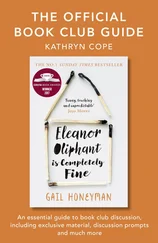Second, when I come on it’s in place of my mate Dan Lydiate – Lyds – which means I end up playing blindside with Martyn Williams at openside. Or rather, we play as twin opensides. Rather than having a six who’s a carrier and a seven who’s a scavenger, we both do a bit of each, and spell each other if need be. After a particularly draining period of play, Martyn asks me if I’ll jump on the openside for the next scrum just so he can catch his breath, and I’m happy to do so.
‘This is the way forward,’ Gethin Jenkins says afterwards. ‘Playing two opensides. Makes you as a team so quick to the breakdown.’
He’s right, of course. When it comes to rugby, Gethin usually is. He reads the game so well, and he isn’t afraid to speak his mind either; he’s the only player I’ve ever seen grab the waterboy’s mike and yell up to the coaches, ‘Get X off now, he’s playing shit!’ (X was playing shit, and the coaches did indeed pull him off.)
In years to come this is how I’ll play with Justin Tipuric for Wales and Sean O’Brien for the Lions; I might have 6 on my back, but I’ll still be playing as a 7. And those combinations will respectively yield two of the most memorable victories of my international career.
Sunday, 17 January 2010. The Six Nations is almost upon us, and I know this is it. Summer tours and autumn internationals can be experimental – a chance to try out new players and combinations, perhaps give the more senior and experienced players a rest – but the Six Nations is the real thing. Every country picks their best team. If I’m selected here, I’ll really start to feel that I belong in a Welsh shirt.
Even as a fan, I always loved the Six Nations, and on the morning of every match I’d read all the papers I could find: the predictions, the stories, the latest bulletins from inside the Wales camp. The tournament has such a long and varied history, and every year the players get a chance to add to that history by making some of their own. Five weekends to look forward to in the cold and damp winter days, and the simple primary colours of the competing teams: Welsh red, English white, Irish green, French blue, Scottish navy and Italian azure.
I’m driving back from Loughborough, where I’ve been seeing Rach. She’s studying there, and it’s 150 miles each way, but we try to see each other as much as possible. I know the squad’s due to be announced today, and each player selected will receive a text message by midday to let them know.
I’ve got my ringer turned up to max as midday approaches.
Silence.
The midday news on the radio comes and goes. Still nothing.
Maybe I didn’t play well enough in the autumn internationals. Maybe I haven’t been playing sufficiently well for the Blues lately. I think I’ve done enough on both those fronts, but then again I’m not the one making the selection calls. Am I another nearly man? Rugby’s full of them. The kind who play a few games at international level but can’t really cut it.
At 12.15 I pull into a petrol station. I’m filling the car up when I hear the text tone.
Congratulations, you’re in the Six Nations squad. An email will follow.
The relief. The sheer relief. ‘Yeah!’ I shout as loud as I can. The other customers are looking at me a bit strangely.
The attendant’s voice comes over the tannoy. ‘Pump 6. No mobile phones on the forecourt.’
Saturday, 13 February. Wales 14 Scotland 24, with 12 minutes left. I come on for Martyn. All the second half we’ve been attacking, and even though we’re still ten points down, we – and the crowd – believe we can come back. The game’s frantic, and I have to hit the ground running, adjust myself to its pace instantly.
I make some yards down the left-hand side. A minute or so later, I’m caught in possession by a couple of Scottish forwards. I’m fresh against some tired boys, and I’m hitting the rucks well, but I’m not carrying the ball as well as I could do.
There are only three minutes left when Pence – Leigh Halfpenny – scoots in for a try, which Stephen Jones converts. As we go back to halfway, Jonathan Thomas says something, but although he’s right next to me I can’t hear a word over the crowd.
We still trail by three. Now Lee Byrne goes through, kicks ahead – and is taken out by Phil Godman, who’s sin-binned. Penalty. Three points to draw. Stephen knocks it over as though it’s the training ground.
This is fantastic. If this is the Six Nations, I can’t get enough of it.
The clock’s already gone red when Scotland kick off for the last time. With Godman and Scott Lawson in the bin, we’ve got a two-man advantage. Stephen kicks to the corner for Pence to chase. Pence scrabbles, darts, sets up the ruck. We work it left and left again – and there’s Shane Williams, arm aloft as he goes under the posts to win it in the second minute of added time.
The Millennium goes mental.
There’s this guy called Andy McCann, who’s working with the squad. He’s a psychologist, which of course immediately brings to mind patients on couches and drawings of a house that reveals you have unresolved mother-attachment issues or something like that.
Andy gets that kind of stereotyping a lot, and always explains patiently that psychoanalysts, not psychologists, are the couch and Freud guys. He likes to think of himself more as a mental-skills coach, in the same way that we have coaches for attack, defence, scrums, fitness and so on. And it’s about something physical that I first really get chatting to him.
‘I’ve got some confidence issues when it comes to ball-carrying,’ I say.
‘That’s what I’m here for,’ he replies.
I go to see him in his room. He doesn’t tell me which other members of the team he works with, as all his stuff is confidential: more like a doctor–patient relationship than a coach–player one. I know that about half the squad use him, but I don’t know which half unless boys come out and say so. There’s still a stigma attached to seeing him in some quarters, as though it’s embarrassing, an admission of weakness.
I don’t care. Everyone can improve somewhere, and I’m no different. I want to be a better player tomorrow than I was yesterday, and if Andy can help me in that, then happy days. To me, it’s no different from doing extra gym training or sitting in my pyjamas counting McCaw’s tackle rate in Super Rugby. If it’s going to give me an advantage, then I’d be a fool not to give it a go.
In any case, Andy instantly makes me feel so comfortable that there’s no chance of being embarrassed.
‘Breathe in and out,’ he says. ‘In and out properly, using your diaphragm, until you feel relaxed. When you’re breathing in, that’s positive green energy; when you’re breathing out, that’s negative red energy. Positive energy in, negative energy out. Good. Close your eyes. Now, your next game’s against Ireland at Croke Park, yes? Imagine the noise. So much noise. Always is with Irish crowds, the way they get behind their team. You’re on the bench, and all this noise is swirling around you. Embrace it. Don’t let it intimidate you. It’s there for you just as much as it is the Irish players. Use it, the way they use it. Feed off it, the way they feed off it.
‘You’re warming up. Along the sidelines, behind the posts. Getting your head as well as your body right. Any minute now you’re going to get the nod. There it is. Warby, you’re on. The announcer’s voice. ‘Wales, Number 19, Sam Warburton. The crowd cheering your name. On you come. You’re relaying instructions from the coaches. Your voice and body language scream energy and freshness, and those by themselves give the other lads a lift.
Читать дальше












